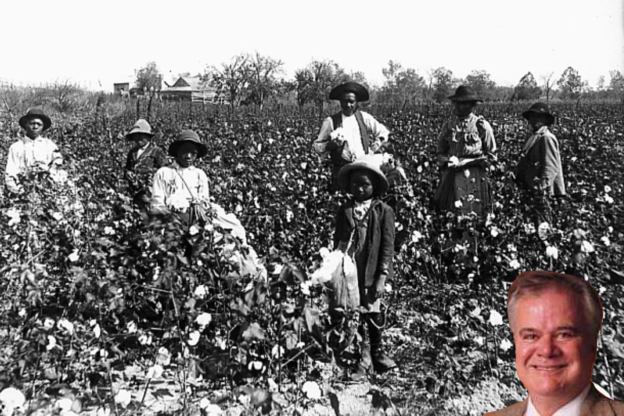

Rights are a zero-sum game
The pro-marriage discrimination amendment supporters become more facile and mendacious with each passing day. But they aren’t on the same page, which is revealing.
Last week, Archbishop Nienstedt wrote, Never fear, we aren’t depriving anybody of existing rights! They’re already slaves! (He didn’t make the second statement, although he could just as well have.)
In the Strib yesterday (September 4th), Robert Delahunty, a professor at the St. Thomas Law School, flips the argument around, Yes, giving the slaves their freedom granted them rights, which was probably a good idea, although not everyone thought so at the time, but you have to admit that it deprived slave owners of their rights!
Beg pardon, Bob?
Delahunty apparently thinks that the whole world is just a big zero-sum rights game.
Free the slaves? Think of the slave owners!
Give women the vote? Think of the misogynists!
Freedom not to get shot? Think of the gun owners!
Let gays marry? Think of the bigots!
Gosh, Bob, I hadn’t thought of all of those poor people. Thanks for sharing this.
In Bob World, the ability to oppress somebody is apparently a right, the loss of which can be as keenly grieved as your grief over losing the right to freely associate or express yourself. It is nothing short of raising bigotry to a civil right. Delahunty puts it this way:
[ ] True, people of the opposite sex are still free to marry one another even if people of the same sex can do so as well. But proponents of the marriage amendment argue that an important freedom is being lost: that of living in a social world in which marriage has a particular meaning and is related in specific ways to natural reproduction and family life. [emphasis added]
In other words, it isn’t as much fun if other people can do it, too.
Imagine also that Delahunty was writing about miscegenation in the years leading up to the Supreme Court case Loving v. Virginia (still the best court case caption in recorded history) outlawing it. Fits perfectly, doesn’t it?
It isn’t hard for me personally to hang this one in the balance and see which side comes up light.
Delahunty’s op-ed is really a counterpoint to a piece written a few days early by Professor Mark Osler, also a St. Thomas University Law Professor. Professor Osler opposes the amendment and wrote that putting the ban in the constitution would be especially bad ju ju because it is hard to change, and it crosses the rubicon of what we think constitutions are for: the preservation of immutable principles and the preservation and expansion of individual rights.
Illogical, Delahunty replies, harrumpf. Delahunty’s case for Osler’s illogic is the slavery hypothetical gem described above. I would say, Bob, that it is a slender reed indeed on which to lean in making the claim of an opponent’s illogic.
According to Delahunty, Olser is mistaken historically, too, about constitutions being use to preserve and expand individual rights. His Pièce de résistance evidence proving this is, and I am not making this up, the Bill of Rights. Delahunty’s point is that the Bill of Rights wasn’t in the original constitution. Whatever.
The Bill of Rights, most of us are pretty sure, was added to the Constitution virtually at its inception to provide rights for individuals and states that the Framers though were missing from the original document. The Bill of Rights was not added years later as you might add a garage to a house. And as Professor Osler says in his article, if you look at amendments to both the federal and state constitutions over the years, they are pretty uniformly about expanding individual rights, not the reverse.
Of course, there was Prohibition, but that was backtracked on pretty quickly. Kind of a cautionary tale, eh?
It might do to remember, kids, that Robert Delahunty was in the Office of Legal Counsel in the Justice Department during the Bush administration: the OLC is the Justice Department’s law firm. Think about it before you fill in the circle next to the name Willard Mittens Romney, lest we wind up with thinking like this back there again.
Thanks for your feedback. If we like what you have to say, it may appear in a future post of reader reactions.

